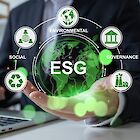Anything but
Greenwashing
In the near future, almost all capital market-oriented companies will be obligated to conduct sustainability reporting under the Corporate Sustainability Reporting Directive (CSRD). Currently, it applies only to large companies. Capital market-oriented small and mid-sized businesses, however, also face this obligation. Preparing sustainability reports and other ESG reports is a key requirement in job vacancies. Many organizations seem to still be at the beginning of this process. Their task is to first develop a sustainability strategy, then implement it.
Sustainability management relies fundamentally on valid data. This data is essential for being able to develop a strategy with measurable goals and KPIs. Recording and analyzing relevant figures is an important part of everyday work for specialists in this area. Many of them will be completing analyses for their future employers to help make up for deficits in sustainability.
To counteract global climate change, the German federal government has enacted the Climate Protection Act, with the goal of being greenhouse gas neutral by 2045. Companies play an important role in reducing CO2 emissions. Some of the specialists sought will be tasked with identifying sources of CO2 emissions within the company. On this basis, some sustainability experts will develop and implement a decarbonization strategy (8.2 %). Others will examine supply chains at their new jobs so they can be modified according to the environmental standards for international supply chains (9.3 %).
Sustainability activities affect the entire company. Employees are in constant exchange with other departments, acting as interfaces. Involving them is important in order to find common starting points for making improvements. This includes trainings where specialists foster awareness for ESG issues and sensitize workers on the consequences of their own actions, as well as the opportunities that ESG regulations hold.
Source: DEKRA Akademie 2024
Base: 343 job vacancies (multiple responses)
Tools
Standards and language
Under the reporting obligation, sought-after specialists will have an excellent knowledge of sustainability reporting. More than half of requirement profiles state that candidates should be familiar with associated guidelines (54.8 %) such as the European Sustainability Reporting Standards (ESRS), which define how reports must be structured.
Almost one in five applicants must be familiar with the EU taxonomy, the EU-wide system for classifying sustainable economic activities (18.4 %). It defines binding criteria for sustainable business based on six main goals. Other advertisements just mention that future employees must be generally familiar with environmental standards and certifications.
Few large companies today are active only on a national level. Even if they do not have international locations, their supply chains or customer relationships are usually international. In this respect, jobs in sustainability management are international as well. Supply chains must be tracked and reviewed to their points of origin. Because of this, English fluency is expected in these professions, and many employers emphasize that they expect very good spoken and written English or general fluency in English (43.4 % and 20.4 %). In addition, potential applicants should also have very good fluency in German (38.8 %).



























